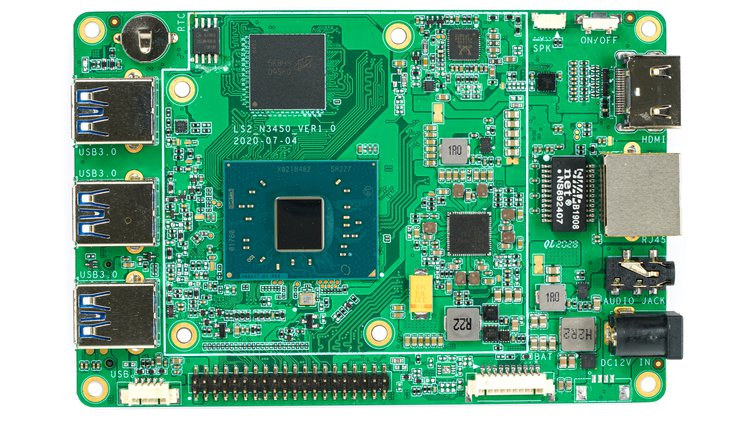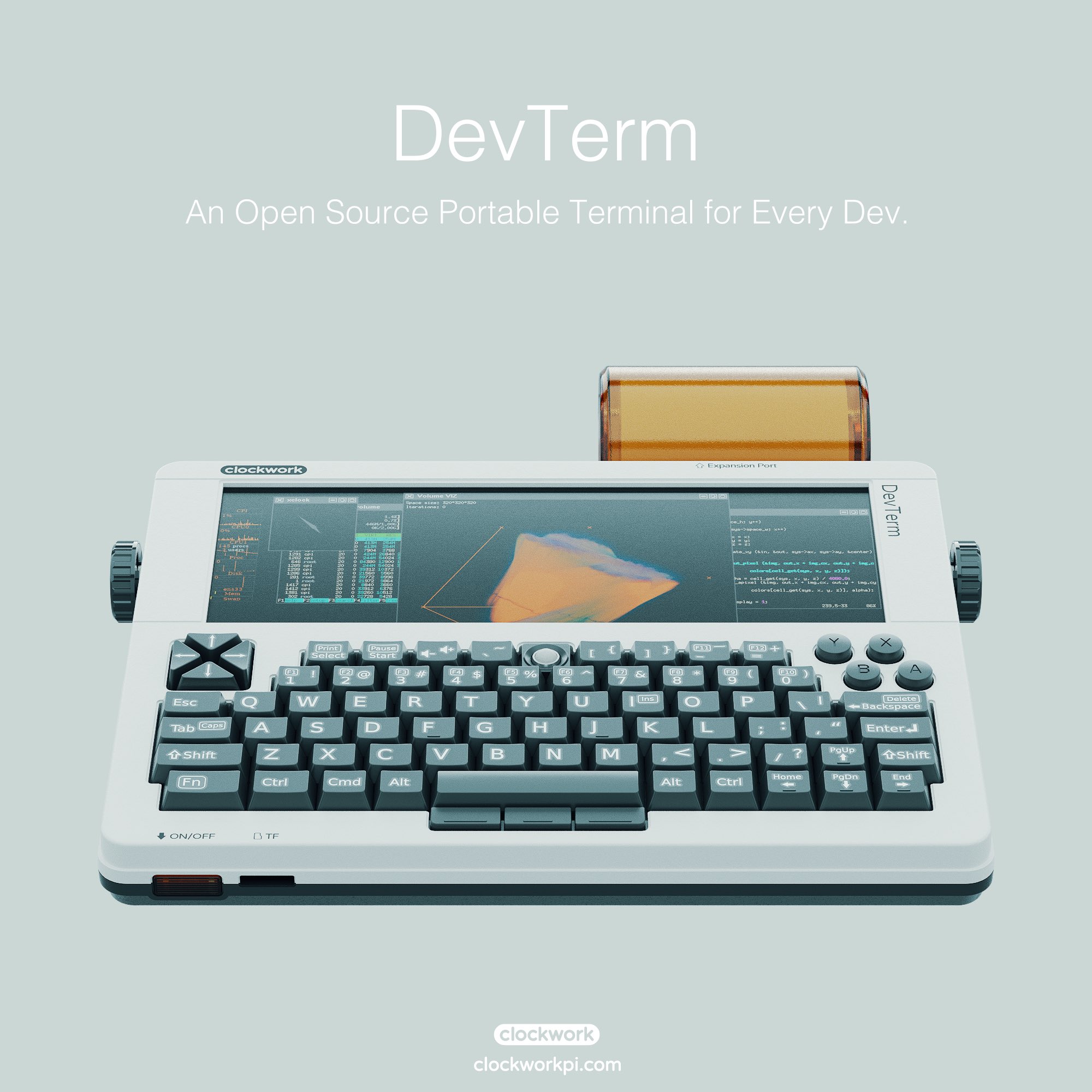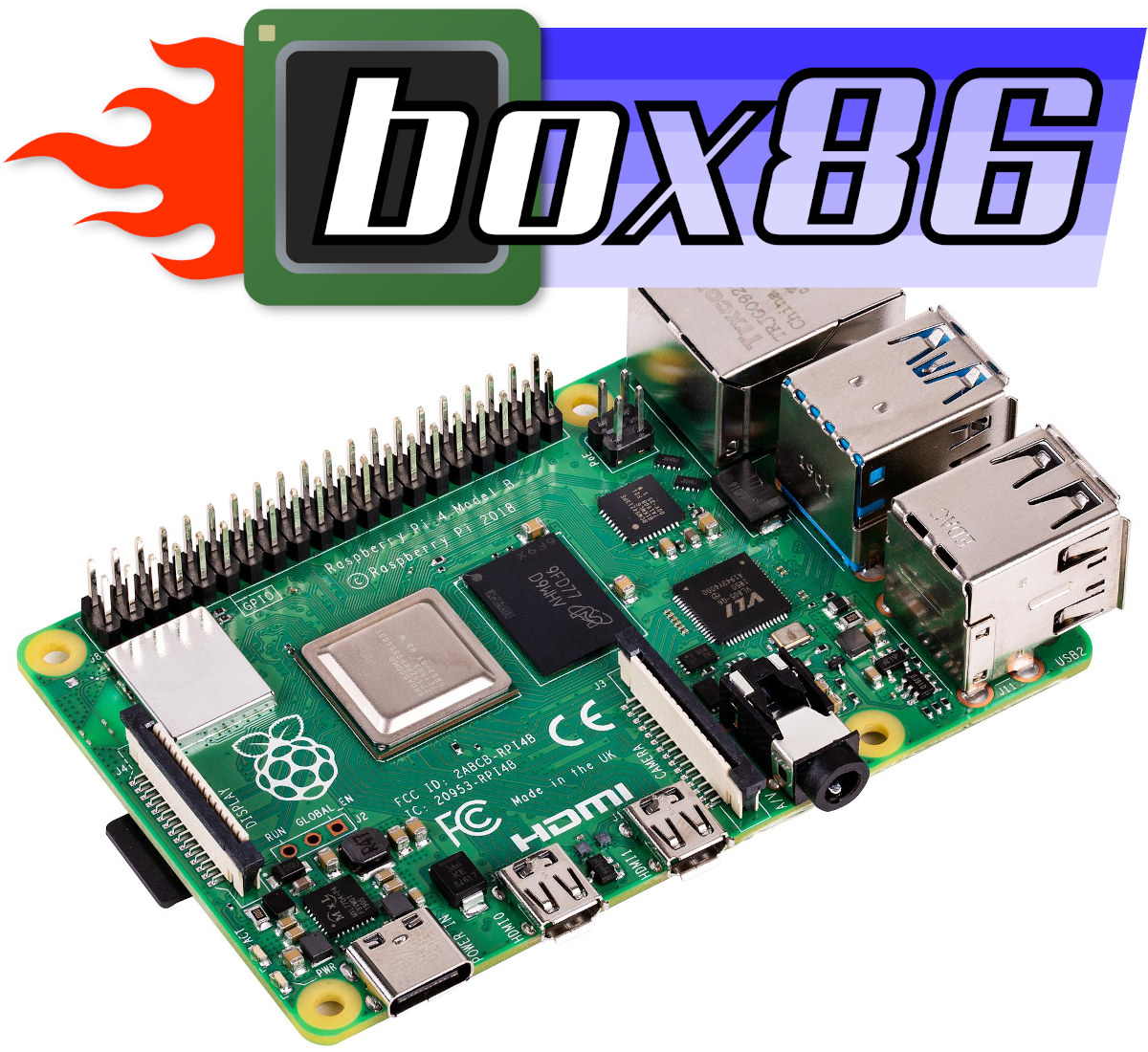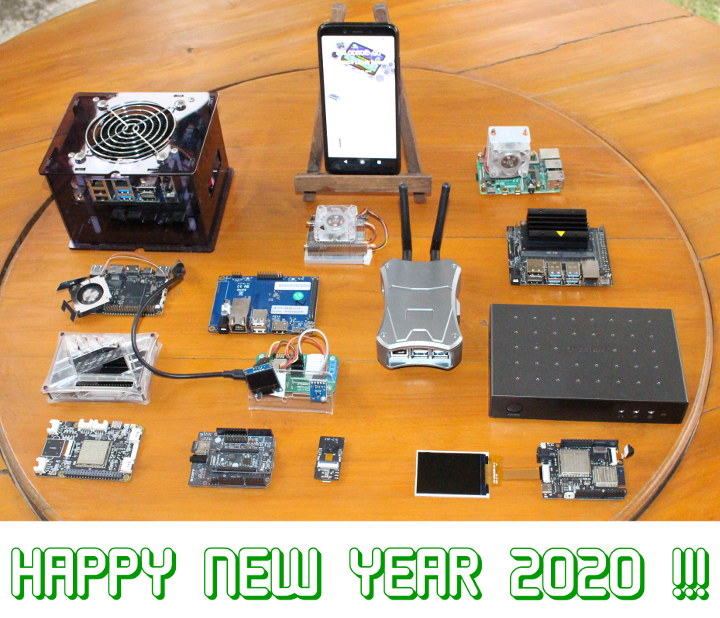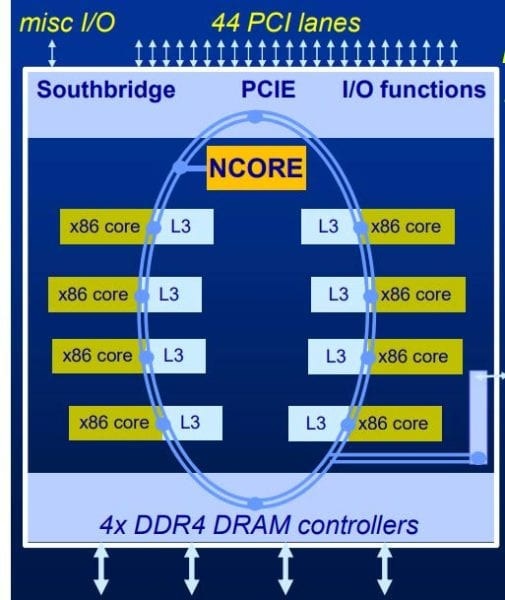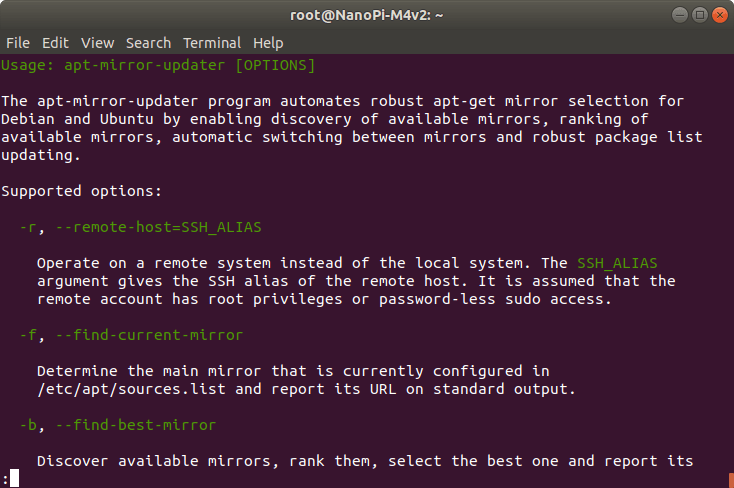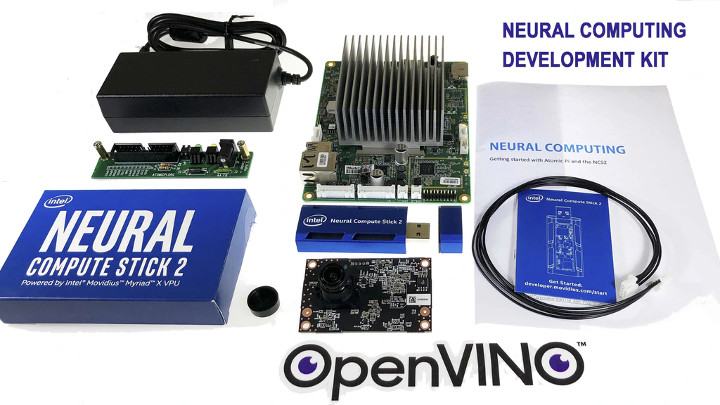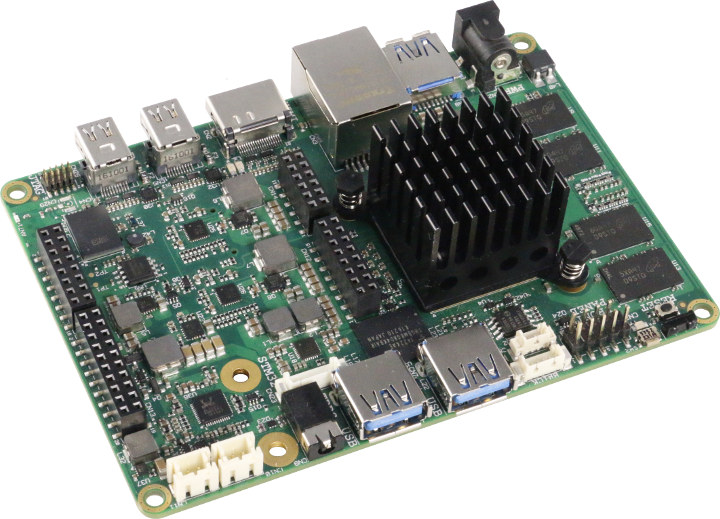We’ve seen several x86 SBCs made for the makers’ community including AAEON Up Board family, AMD powered UDOO BOLT boards, and Seeed Studio Odyssey-X864105 SBC and mini PC. Hackboard 2 is another one of those single board computers. Powered by a dual-core Intel Celeron N4020 Gemini Lake Refresh processor coupled with 4GB DDR4 RAM and 64GB eMMC flash, the board offers the usual HDMI, Ethernet, USB ports, plus a 40-pin Raspberry Pi header, and an optional 4G or 5G modem. Hackboard 2 specifications: SoC – Intel Celeron N4020 dual-core Gemini Lake Refresh processor @ 1.1 GHz / 2.8 GHz (Turbo) with 4MB cache, Intel UHD graphics 600; 6W TDP System Memory – 4GB DDR4 RAM Storage – 64 GB onboard eMMC flash, 2x NVMe M.2 slots for up to 4 TB additional storage Video output HDMI 2.0a output up to 4K 30-pin eDP connector for 11.6″ to 15.6″ displays 6-pin […]
DevTerm with ClockworkPi v3.14: a modular, portable computer
After the launch of ClockworkPi GameShell in Q4 2018, now ClockworkPi has come with yet another exciting product. DevTerm is a portable computer that comes with a 6.8-inch IPS screen, a keyboard with 67 keys, and a battery module, all connected to ClockworkPi v3.14 carrier board and a choice of core modules. It will also come with an optional built-in thermal printer. ClockworkPi v3.14 Mainboard and the Core boards The mainboard ClockworkPi v3.14 uses a compact design and comes with a reduced size of 95x77mm. With a modular design, it gives you a choice of “core board” modules for various applications. Moreover, ClockworkPi v3.14 is now compatible with the Raspberry Pi CM3 series, which means that your work on the Raspberry Pi can be “teleported” to a portable terminal without hassle. It has integrated 5GHz WIFI (802.11ac) and Bluetooth 5.0 which makes it suitable for wireless communication applications as well. […]
Box86 is an x86 Emulator for Raspberry Pi and other 32-bit Arm platforms
Last week, we wrote about Raspberry Pi 4 Vulkan project status and future plans, and one person commented they are currently trying to get dxvk to work Box86, and that CNX Software should write about the latter. Cool, but what does that mean? dxvk is an open-source Vulkan-based implementation of D3D9, D3D10, and D3D11 for Linux, and Box86 is a Linux userspace x86 emulator that works on 32-bit Arm targets like the Raspberry Pi SBC. Nice, and I remember I ran x86 Linux and Windows on Raspberry Pi a few years ago using a closed-source commercial program called Exagear, but having an open-source solution is even better. That means 64-bit Arm is not supported at all, and Box86 can not even be built for Aarch64 targets. Since many x86 games require OpenGL, as opposed to OpenGL ES, Box86 works best in conjunction with gl4es. By installing Box86 on Raspberry Pi […]
Year 2019 in Review – Top 10 Posts and Stats
2019 is closing to an end, or you may already be into 2020 while reading this post. In any case, that means it’s time to look back at 2019 and look forward to the events and new products to take place next year. While 2018 was a boring year for new processors, 2019 brought us some interesting new chips such as Amlogic S922X / A311D, or the first Arm Cortex-A55 only processors such as Amlogic S905X3. Rockchip RK3399Pro was promising when it was announced last year, but it never really took off. It was a pretty quiet year for Allwinner as well. RISC-V architecture has been ramping up with the first general-purpose RISC-V MCU: GD32V, WCH CH572 Bluetooth LE MCU, the launch of more SiFive RISC-V cores, and Kendryte K210 RISC-V AI processor announced last year has found its way into more and more boards. There have also been the […]
Centaur Unveils an x86 SoC with Integrated AI Coprocessor
Artificial intelligence is handled at different levels in the ecosystem with ultra-powerful systems in the cloud equipped with dedicated hardware such as FPGA or GPU cards, while on the other side of the spectrum we have Arm or RISC-V based processor with AI accelerator for low power systems like smartphones or battery-powered smart cameras. Centaur Technology aims to provide a solution catering to the middle segment of devices that don’t need ultra-low power consumption, nor the highest possible peak performance, but still require a relatively compact form factor and low costs. Their solution is a still-unnamed octa-core x86 processor featuring Centaur NCORE AI coprocessor. SoC with built-in NPU (Neural-network Processing Unit) is pretty common in the Arm and RISC-V world, but it’s apparently a world’s first in the x86 space since existing solutions are all based on external accelerators. Key features of the Centaur x86 AI processor: x86 microprocessor with […]
Changing Ubuntu Apt Mirror from the Command Line, and the Lack of Arm64 Mirrors
When you install Ubuntu on a computer, you’d normally go through the installation ISO which guides you through a wizard where you select your location among other things, and that means you get connected to the mirror closest to your location allowing timely updates. But for those of us who flash Ubuntu images on Arm SBC’s, the mirror is normally fixed to the one set by the developer be it in China or Slovakia, or defaults to the US mirror. It still works, but it can be slower than necessary. In a computer, an easy way to change that from Ubuntu desktop to launch Software & Update program and change the download from field to a mirror in your country or neighboring country as shown below. But I’ve found myself mostly connecting to boards over SSH since it’s easier that way for reviews. One way to change the mirror would […]
Atomic Pi x86 SBC Meets Intel Neural Compute Stick 2 in $99 Neural Computing DevKit (Crowdfunding)
IoT Team launched the $34 Atomic Pi SBC powered by an Intel Atom x5-Z8350 processor via a Kickstarter campaign last December. At the time, it only ships to the US, and looked too good to be true. But the thing is real coming from a failed robotics project, and the low-cost x86 board went back for sale via Amazon and other channels with worldwide availability last spring. The price has even gone a bit lower as you’ll find it for $32.95 on Amazon. Note that it requires some technical skills to get started and with 16GB eMMC flash it only supports Liux distributions such as Ubuntu 18.04, and installing Windows 10 is possible, but you’ll be seriously limited. Atomic Pi is back in the news, as IoT Team has now launched another Kickstarter campaign for the board, except it’s not sold standalone, but instead as part of a $99 neural […]
UDOO X86 II SBC Combines Intel Braswell SoC with Microchip ATMega32U4 “Arduino” MCU
UDOO X86 development board was first introduced in a crowdfunding campaign in 2016 with a quad-core Intel Braswell processor coupled with an Arduino 101 compatible Intel Curie module for real-time I/O processing. Early July of next year (2019) the Intel processor and module seems to be going so well and have a bright future together with UDOO X86 board and accessories becoming broadly available. But life can be cruel at times, and Intel announced their plan to discontinue Intel Curie and other IoT projects just a few weeks later with the last shipment scheduled for July 2018. SECO, the company behind UDOO, could only order so much stock of Intel Curie module, so they had to design an alternative, and here we are with UDOO X86 II SBC offering many of the same features but replacing Intel Curie module by a Microchip ATmega32U4 MCU compatible with Arduino Leonardo. Two […]


